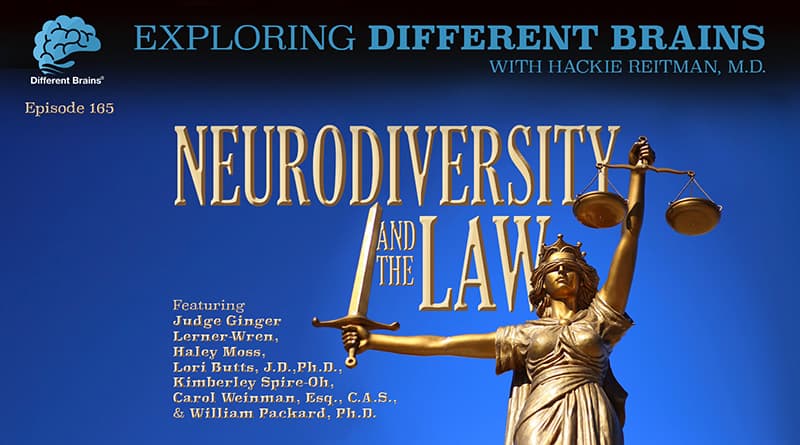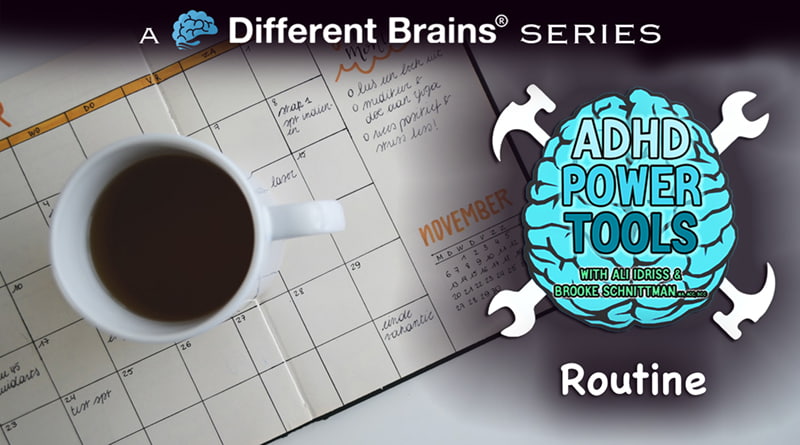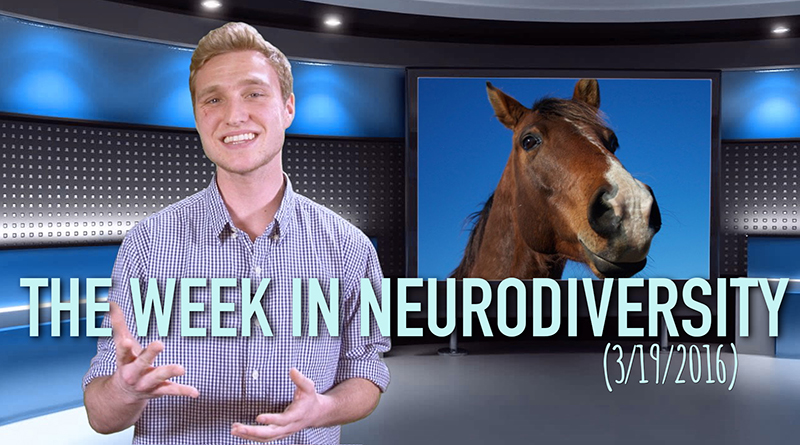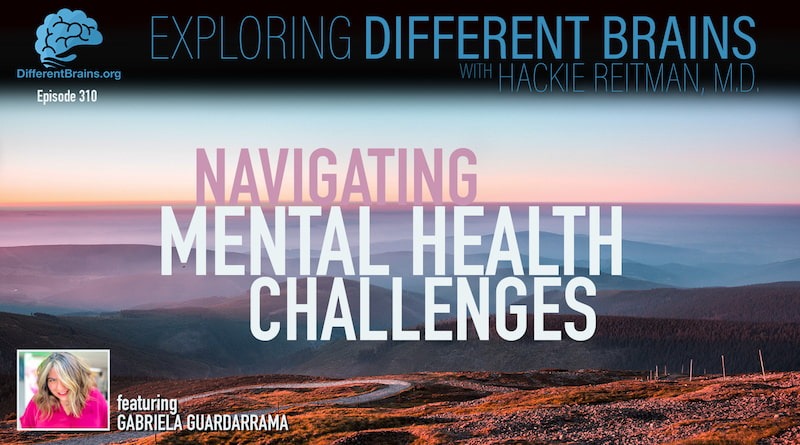
Neurodiversity & The Law, w/ Judge Ginger Lerner-Wren, Haley Moss, and more | EDB 165
Judges, lawyers, self-advocates, and more help us understand the rights of the neurodiverse!
(25 minutes) In this special episode, Hackie Reitman, M.D. welcomes various legal experts and advocates to get their advice on how to best interact with the law. Featured are Haley Moss (healthcare attorney, artist, author of “Middle School: The Stuff Nobody Tells You About” and “A Freshman Survival Guide for College Students With Autism Spectrum Disorders”, & autism self-advocate), Justice Ginger Lerner-Wren (judge & legal rights advocate), Carol Weinman, Esq., C.A.S. (legal consultant, author, mediator, trainer, & nationwide autism speaker), Lori Butts, J.D., Ph.D. (psychologist & president and director of the Clinical & Forensic Institute), William Packard, Ph.D. (author of “Intellectual Disability and the Criminal Justice System: Solutions through Collaboration” & jail diversion team facilitator), and Kimberly Spire-Oh (private practice attorney & legal rights advocate)
For more about the featured guests:
Haley Moss: http://haleymossart.com/ and http://haleymoss.net/ or click https://differentbrains.org/floridas-first-openly-autistic-lawyer-with-haley-moss-edb-160/ for her full interview
Justice Ginger Lerner-Wren: Twitter: https://twitter.com/judgewren or click https://differentbrains.org/justice-for-the-neurodiverse-with-judge-ginger-lerner-wren-edb-21/ for her full interview
Carol Weinman, Esq., C.A.S.: http://www.weinmanlawoffice.com/ or click https://differentbrains.org/what-everyone-should-know-about-autism-and-the-legal-system-with-carol-s-weinman-esq-c-a-s-edb-132/ for her full interview
Lori Butts, J.D., Ph.D: http://cfiexperts.com/ or click https://differentbrains.org/brains-and-badges-neurodiversity-and-law-enforcement-with-dr-lori-butts-edb-41/ for her full interview
William Packard, Ph.D.: https://www.amazon.com/Intellectual-Disability-Criminal-Justice-System/dp/1489591389 or click https://differentbrains.org/neurodiversity-criminal-justice-system-william-packard-ph-d-exploring-different-brains-episode-18/ for his full interview
Kimberly Spire-Oh: http://www.ksolawfirm.com/ or click https://differentbrains.org/protecting-the-legal-rights-of-different-brains-with-kimberley-spire-oh-edb-125/ for her full interview
To listen or download the podcast version of this episode, see the embedded player below.
Or look for us on your favorite podcast provider:
iTunes | Stitcher | SoundCloud
TRANSCRIPTION
HACKIE REITMAN, M.D. (HR): Hi, I’m Dr. Hackie Reitman. Welcome to this special episode of Exploring Different Brains. Today, we are going to revisit some of the legal experts to get their advice as to how the neurodiverse and their advocates can best interact with the legal system.
Haley Moss
HR: What’s one thing people with autism should know about the law?
HM: That there are safeguards to protect you, I don’t practice in the areas ADA or disability law, but there are certain aspects of legislation that I do know about, such as the IDEA in education, section 504 and the ADA so all of those interact with your life and can actually help you.
HR: You know, the way I’m seeing it is that all of these different silos, you know, autism here and Down syndrome there, and then you have Alzheimer’s over here, and you have PTSD and mental health issues; many of the same tools and many of the same challenges are in all of these silos so we’re all trying to get everyone to play nicely in the sandbox.
HM: I absolutely agree with that, I am not a fan of the “my disability can beat up your disability” type attitude that some people think that everything is very separate- everything is together, especially when we talk about the law, is all of these different safeguards so people won’t discriminate based on your disability.
HR: How did you choose the firm that you are with?
HM: I chose where I’m at because I actually got extremely lucky. I met one of the former partners at my firm, I hear chance, and we just connected instantly. They brought me in for an interview. I got along really well with everybody; the managing partner at my firm has a son on the Autism spectrum as well, so we got along really quickly, and had something to connect with and everybody where I work is very pro Neurodiversity, very excited about it, so I feel very accepted, I worked there my second summer in law school; so the summer of 2017, so I knew who I’d been working with, where I would be working, I knew a lot about it from being a Summer associate, and I knew after that it was a great fit. So I was very excited to get started once I got to begin doing official lawyer stuff.
HR: What kind of law do you practice?
HM: I work in healthcare litigation.
HR: What drew you to that?
HM: What drew me to healthcare is that healthcare affects everybody, and as we know that there are different issues with people with disabilities and healthcare so I realized that it just affects every aspect of our lives, and I just think healthcare is super interesting. I’m learning a lot and that’s honestly at this point in my career I’m really excited to learn and be apart of a team and just know more about the practice of law as well.
Justice Ginger Lerner-Wren
HR: As W.C. Fields said in one of his movies “Your Honor this is indeed an honor” and you are one of the nation’s pioneers in the mental health courts going back to the first national mental health court I believe was in 1997. Tell us how that came about?
JGLW: You know it was I cannot believe that we’re edging on twenty years and you know I came to the judiciary from a disability rights background. …And there was an incredible high profile case and it was a murder case. It originated as a murder case involving a young man named Aaron Wen actually did not have mental illness he actually was involved in a very serious motorcycle accident and he suffered traumatic brain injury … and the story very briefly which is really the legacy of the mental health court in Broward and for our nation is that he was checking out of a local grocery store, had some kind of a panic attack or something as he was going through the cashier he ran out of the grocery store, he collided with an elderly woman who fell to the pavement and she died of her brain injuries and Aaron found himself charged with murder and Howard Finkelstein of the Broward County now our Broward County public defender at the time was an assistant chief and he was selected to represent Aaron.
Howard tells a very heartfelt story of sitting down in the living room with Aaron’s parents and his family basically explaining to Howard what it was like to try to find any kind of help for their son which they couldn’t find any… and Howard really began to awaken, he had an incredible awakening of conscience in terms of the short files of Broward County’s community system of care and he wrote the grand jury and he requested a grand jury investigation and sure enough the grand jury accepted his request and a year later, they issued a 153 page scathing grand jury report that was basically saying that Broward County had absolutely no existing mental health community system of care there was no one in charge and essentially no one was accountable to anybody.
The mental health court believe it or not was an outgrowth of that grand jury report and it was Howard, Howard was the thought catalyst behind the development of the specialized court, I happened to get lucky I got into office they were looking for somebody who understood who had a specialized knowledge working with individuals with all kinds of neuro-disabilities and diversity and mental health problems and they asked me as a new rookie judge never did anything in the criminal justice certainly there was no real road map to follow in the mental health court other than the work that I did in the protection an advocacy system for Florida and that proved to be the road map that Broward used for our mental health court and that legacy really belongs to Aaron Wen. It was really Aaron and Howard’s perseverance and dedication to create a refuge. A court of refuge for individuals would not be misunderstood or marginalized by judges and quite frankly by systems that just didn’t get it.
Carol Weinman
HR: What is the biggest single thing that you would think a relative layperson like me or our audience our different brains audience, might not know about the legal system that you can explain to us
CW: Okay, I think the greatest thing, that’s a very good question, I think the greatest thing for you and other people to understand about that is, that from the perspective of the criminal system, if somebody commits a criminal offense they’re main objective and concern is, is this a person that we can safely have out in our community and out in our society is it safe, so often times they will initially say I don’t really want to know why the person did it that’s not my concern I want to know whether I have to be worried that this person is not going to be someone that out in the community is safe to have out there are they going to do it again are they someone that we can’t teach or rehabilitate to not do this for whatever reason they initially did it so they’re concern is basically we’ve got to keep people safe, and so that is what sometimes what people that I’ve dealt with its very easy and I can also get caught in this if I’m not careful sometimes it’s very easy when you’re rooting for the underdog and you understand this different brain to side with the person that is suffering from the disorder but you have to also be able to appreciate the role on the other side and what their concern is and be able to address that to get them to feel comfortable that this person isn’t going to be someone they have to worry about and someone that they have to put in a prison cell.
Dr. Lori Butts
HR: Not long ago, there was a local story about a caregiver of someone with autism who was shot by a policeman. Apparently they were in the street, and the autistic individual he was caring for was rather difficult, and what’s been your experience with educating law enforcement, what you see as the parts of the equation that we didn’t get from that story, and how you see things evolving going forward?
LB: I think that one of the keys is police officers are hyper-vigilant and they have–they’ve got a heightened arousal. And so they’re perceiving, so their perception in that heightened arousal state, is they’re trained to be viewing things as threatening. And so if your brain is trained and on high-alert to see things as threats, it’s more likely you’re going to perceive the threat. Just like if your brain is more relaxed and more happy, you’re going to perceive things as more positive around you. So you’re pre-disposed to seek, you know, to seek out things in your environment. So I think, you know, it’s going to be a difficult task–but I think if you give the law enforcement skills and strategies to breathing techniques or strategies to kind of reduce that arousal response, so that they can view things–you know, not be so quick to view things as threatening, but then, on the other hand, I’m sure the law enforcement is going to say, but I have to protect my life. So that’s a really hard balance.
From their perspective is they’re in a life-threatening situation, their arousal is really high. they’re trained to see the threat and to reduce threats and to also be breathing and calm and to be able to assess this situation, well, maybe it’s not as threatening, and were talking milliseconds. I mean, were talking–these–your brain is assessing the situation in such a rapid–and we can watch videos over and over and over again, but in real-world, that’s a minute–you know that’s a quick assessment, and your life is on the line. So we’ve got to really find ways to balance out–to support law enforcement, so they don’t feel threatened all of the time, which, considering what happened in Dallas, I don’t know how we get there, from their perspective, but to get realistic appraisals of the situations.
William Packard
HR: What are some of the issues that you’ve seen arise when the neurodiverse individual comes in contact with the criminal justice system?
WP: If I have time to give a short history of how I got involved, I think it might explain some of the things that Ive noticed and become aware of. I started in ’78, 1978 at a state school for developmentally disabled adults, and it was a time of de-institutionalization and there were lots of people who had been secluded from society, where by reason of court mandates and court decrees, were literally being forces back into the community. The same thing happened with mentally ill patients at state hospitals throughout the country.
So long way of getting to your question, I later took a job as a community psychologist and was amazed at the other end, out in the community, how many people in my case load were actually involved in the criminal justice system.
Some were adjudicated, some were awaiting trial, some were in detention, some were serving lengthy prison sentences. One thing that was common amongst all of them was that they were naive offenders–many of them were naive offenders. Many of them really didn’t know what they were getting involved in. Many of them, in some of the characteristics of somebody with developmental disabilities is maybe you’re a little gullible, easily manipulated, searching for a sense of belonging, highly suggestible, you tend to acquiesce to what others tell you or try to give them the right answer. You’ll do anything for acceptance–so there’s what I call a perfect storm that can happen. You started the interview by talking about, you know, say older adolescents who, you know, hopefully we can channel in the right directions and help with employments and so forth. But these individuals are basically easily lead. The biggest problems I saw when I was in the community, and definitely when I was researching for my book, was that they are not on the equal playing field as anyone else. So lets say the police are called to a certain location and there’s this guy that’s–looks like he’s showing inappropriate affect in behavior, and he’s just–you know, they ask him some questions and he looks like he’s copying his attitude and saying, I don’t know, I font know, well, actually, he doesn’t want to let on that he really doesn’t know what’s going on, and that he is in over his head and maybe somebody has asked him to stand there and be a patsy and watch out for them–quite often, these people are the people that are left holding the bag, so-to-speak. They are the last to leave the scene of a crime, first to confess and most likely be prosecuted.
And that speaks to their executive functioning problems and lack of knowledge and experience. So I could go on and on explaining some of the traits and characteristics, of which there are many, which make this a serious problem. The most serious problem is, the deeper you get into the criminal justice system, obviously the more serious the matter. So even on a police interview, because of problems with memory and tendency to acquiesce and definitely police have used read technique, in terms of interrogating people, you know, good cop bad cop, listen just help us out, we know you did it, just tell us and well let you go, we can help you if you’re honest with us. Those type of–although a good thing for your common criminal when the police are trying to interrogate, its just totally, totally counter-indicative of our folks. There’s an excellent Netflix documentary–Making of a Murderer–which exemplifies this. I would ask everyone to watch that. You will definitely understand all of the negative–all of the terrible things that can happen. The travesties of justice and specifically, a young man, Brendan Dassey, the full police interrogation of a man who is probably functioning with an IQ of 50, 55–totally being mislead and now he is serving a lengthy prison sentence, and its pretty clear he had nothing to do with it. There are many examples of this.
Justice Ginger Lerner-Wren.
HR: And in the mental health courts if we wanted to give our viewers an idea of the type of people with what diagnoses you see there, what kind of neurodiversity are you seeing there? Could you give us a little brief on that?
JGLW: I could well I think that the good news is and I think you would be so happy to hear the court was designed without labels essentially because we recognize that we wanted to really cast a very wide net meaning that we know for example in our state that we have such a diverse population we have a large population of seniors that have all kinds of neurological disorders some Alzheimer’s to dementia we have individuals who may have had brain injuries from traffic accidents like Aaron Wen. For example our veterans coming back with traumatic brain injuries neurological problems and PTSD and of course we know that the impact of adverse childhood experiences and trauma often leads to cognitive types of problems and then of course we have individuals with all kinds of intellectual learning disabilities and intellectual challenges.
And so the idea behind the establishment of the court was to cast really a neurodiverse net and we really wanted to get people into the court to see where we could help, mostly because Florida you might know this and if your viewers don’t know this they need to and that is Florida is the third largest in the United States and we are literally 49th funded in the entire country. We are in absolute crises and that was the outcome of the grand jury report, we live with that crises we have broken systems a lack of services and resources and the idea behind the court was that we knew this and so we wanted to create a court where we could centralize and martial highly scarce resources and that’s really the beauty behind the court and so people that need help can get the individualized type of care that they need based upon the population and where they are kind of situated and what their needs are and it is a person first approach.
Kimberly Spire-Oh
HR: What is the biggest single thing that you want to educate our Different Brains parent, who are out there; who have a youngster whose brain is a little bit different, who’s in a public school and they don’t quite know a game plan? What do you advise them overall, someone who might be listening or viewing this or reading this?
KS: There are a variety of resources out there to help you. The most important things are to really get to know your child and you probably do know a lot about your child but do research on whatever conditions or things they’re facing. Do research on what your rights are. You know those IEP or 504 plan procedural safeguards they’re sometimes hard to read, but you can look up on the internet and kind of get morally friendly or you know easier to understand explanations of what your rights are. Also you hear so many as a parent I can say you hear so many negative things about your child, a lot of times in the school system or sometimes from people who don’t really understand. You have to try to look for examples of people who have overcome similar conditions or are living with them and functioning really well. There are examples and resources out there you know sometimes to let your child know that there are a lot of very famous successful people who have dyslexia and let them learn the stories of these people will help you get through the difficult times that you’re going to face as you go through school and go through life and try to use some of the resources of other people who are going through what you’ve been through. There are lots of resources if you don’t know how to do these things or where to turn to. There are, if you have very limited resources, legal aid societies that can provide free assistance to you. The centers for Independent Living Options provide free resources and there’s Disability Rights Florida which is our state’s protection and advocacy organization and every single state around the country has one of those they can provide free advocacy and legal services, and help you know provide resources on things and then disability specific organizations including Different Brains is unique and that it is not specific it’s a wide variety of them but look to organizations and entities. They can provide resources and information the more of that that you know take advantage of the better off you will be.
[/expand]



